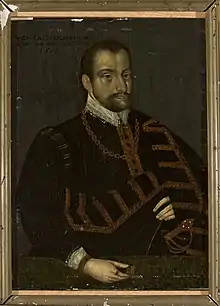Frederick IV, Elector Palatine
Frederick IV, Elector Palatine of the Rhine (German: Kurfürst Friedrich IV. von der Pfalz; 5 March 1574 – 19 September 1610), only surviving son of Louis VI, Elector Palatine and Elisabeth of Hesse,[1] called "Frederick the Righteous" (German: Friedrich Der Aufrichtige; French: Frédéric IV le juste).
| Frederick IV | |
|---|---|
 Frederick IV, Elector Palatine | |
| Elector Palatine | |
| Reign | 22 October 1583 – 19 September 1610 |
| Predecessor | Louis VI |
| Successor | Frederick V |
| Born | 5 March 1574 Amberg |
| Died | 19 September 1610 (aged 36) Heidelberg, Electorate of the Palatinate, Holy Roman Empire |
| Spouse | Louise Juliana of Nassau |
| Issue | Luise Juliane, Countess Palatine of Zweibrücken Katharina Sofie Frederick V, Elector Palatine Elisabeth Charlotte, Electress of Brandenburg Anna Eleonore Louis William Maurice Christian Louis Philip, Count Palatine of Simmern-Kaiserslautern |
| House | Wittelsbach Palatinate-Simmern |
| Father | Louis VI, Elector Palatine |
| Mother | Elisabeth of Hesse |
| Religion | Calvinism |
Life
Born in Amberg, his father died in October 1583 and Frederick came under the guardianship of his uncle, John Casimir, an ardent Calvinist, who ruled as regent until his death. The Calvinist mathematician and astronomer Bartholemaeus Pitiscus served as Frederick's tutor and later became court preacher.
In January 1592, John Casimir died and the 17 year old Frederick assumed control of the government of the Electorate of the Palatinate. Frederick continued John Casimir's anti-Catholic measures and in 1608 became the head of the Protestant military alliance known as the Protestant Union. He soon fell prey to alcoholism, leaving state matters largely to his chief minister Christian of Anhalt.[2] Frederick IV died in 1610 in Heidelberg.
Family and children
In 1593, Frederick married Louise Juliana of Nassau,[1] the daughter of William I of Orange and Charlotte de Bourbon-Monpensier. They had eight children:
- Luise Juliane of the Palatinate (Heidelberg, 16 July 1594 - Meisenheim, 28 April 1640),[1] married in 1612 to Pfalzgraf John II, Count Palatine of Zweibrücken.
- Katharina Sofie of the Palatinate (Heidelberg, 10 June 1595 - Köln an der Spree, 28 June 1626).
- Frederick V, Elector Palatine (Jagdschloß Deinschwang, 16 August 1596 - Mainz, 29 November 1632); married in 1613 Elizabeth Stuart, Queen of Bohemia[1]
- Elisabeth Charlotte of the Palatinate (Neumarkt, 19 November 1597 - Crossen an der Oder, 26 April 1660); married in 1616 to Elector George William of Brandenburg[1]
- Anna Eleonore of the Palatinate (Heidelberg, 4 January 1599 - Heidelberg, 10 October 1600).
- Louis William of the Palatinate (Heidelberg, 5 August 1600 - Heidelberg, 10 October 1600).
- Maurice Christian of the Palatinate (Heidelberg, 18 September 1601 - Heidelberg, 28 March 1605).
- Louis Philip, Count Palatine of Simmern-Kaiserslautern (Heidelberg, 23 November 1602 - Krossen, 6 January 1655).
Ancestors
| Ancestors of Frederick IV, Elector Palatine | ||||||||||||||||||||||||||||||||||||||||||||||||||||||||||||||||||||||||||||||||||||||||||||||||||||||||||||||||||||||||||||||||||||||||||||||||||||||||||||||||||||||||||||||||||||||||||||||||||||||||||||||||||||||||||||||||||||||||||||||||||||||||||||||||||||||||||||||||||||||||||||||||||||||||||||||||||||||||||||||||||||||||||||||||||||||||||||||||||||||||||||||||||||||||||||||||||||||||||||||||||||||||||||||||||||||||||||||||||||||||||||||||||||||||||||||||||||||||||||||||||||||||||||||||||||||||||||||||||||||||||||||||||||||||||||||||||||||||||||||||||||||||||||||||||||||||||||||||
|---|---|---|---|---|---|---|---|---|---|---|---|---|---|---|---|---|---|---|---|---|---|---|---|---|---|---|---|---|---|---|---|---|---|---|---|---|---|---|---|---|---|---|---|---|---|---|---|---|---|---|---|---|---|---|---|---|---|---|---|---|---|---|---|---|---|---|---|---|---|---|---|---|---|---|---|---|---|---|---|---|---|---|---|---|---|---|---|---|---|---|---|---|---|---|---|---|---|---|---|---|---|---|---|---|---|---|---|---|---|---|---|---|---|---|---|---|---|---|---|---|---|---|---|---|---|---|---|---|---|---|---|---|---|---|---|---|---|---|---|---|---|---|---|---|---|---|---|---|---|---|---|---|---|---|---|---|---|---|---|---|---|---|---|---|---|---|---|---|---|---|---|---|---|---|---|---|---|---|---|---|---|---|---|---|---|---|---|---|---|---|---|---|---|---|---|---|---|---|---|---|---|---|---|---|---|---|---|---|---|---|---|---|---|---|---|---|---|---|---|---|---|---|---|---|---|---|---|---|---|---|---|---|---|---|---|---|---|---|---|---|---|---|---|---|---|---|---|---|---|---|---|---|---|---|---|---|---|---|---|---|---|---|---|---|---|---|---|---|---|---|---|---|---|---|---|---|---|---|---|---|---|---|---|---|---|---|---|---|---|---|---|---|---|---|---|---|---|---|---|---|---|---|---|---|---|---|---|---|---|---|---|---|---|---|---|---|---|---|---|---|---|---|---|---|---|---|---|---|---|---|---|---|---|---|---|---|---|---|---|---|---|---|---|---|---|---|---|---|---|---|---|---|---|---|---|---|---|---|---|---|---|---|---|---|---|---|---|---|---|---|---|---|---|---|---|---|---|---|---|---|---|---|---|---|---|---|---|---|---|---|---|---|---|---|---|---|---|---|---|---|---|---|---|---|---|---|---|---|---|---|---|---|---|---|---|---|---|---|---|---|---|---|---|---|---|---|---|---|---|---|---|---|---|---|---|---|---|---|---|---|---|---|---|---|---|---|---|---|---|---|---|---|---|---|---|---|---|---|---|---|---|---|---|---|---|---|---|---|---|---|---|---|---|---|---|---|---|---|---|---|---|---|---|---|---|---|---|---|---|---|---|---|---|---|---|---|---|---|---|---|---|---|---|---|---|---|---|---|---|---|---|---|---|---|---|---|---|---|---|---|---|---|---|---|---|---|---|---|---|---|---|---|---|---|---|---|---|---|---|---|---|---|---|---|---|---|---|---|---|---|---|---|---|---|---|---|---|---|---|---|---|---|---|---|---|---|---|---|---|---|---|---|---|---|---|---|---|---|---|---|---|---|---|---|---|---|---|---|---|---|---|---|
| ||||||||||||||||||||||||||||||||||||||||||||||||||||||||||||||||||||||||||||||||||||||||||||||||||||||||||||||||||||||||||||||||||||||||||||||||||||||||||||||||||||||||||||||||||||||||||||||||||||||||||||||||||||||||||||||||||||||||||||||||||||||||||||||||||||||||||||||||||||||||||||||||||||||||||||||||||||||||||||||||||||||||||||||||||||||||||||||||||||||||||||||||||||||||||||||||||||||||||||||||||||||||||||||||||||||||||||||||||||||||||||||||||||||||||||||||||||||||||||||||||||||||||||||||||||||||||||||||||||||||||||||||||||||||||||||||||||||||||||||||||||||||||||||||||||||||||||||||
References
- Thomas 2010, Appendix B.
- Parker 1997, p. 23.
Sources
- Parker, Geoffrey (1997). The Thirty Years' War (2nd ed.). Routledge.
- Thomas, Andrew L. (2010). A House Divided: Wittelsbach Confessional Court Cultures in the Holy Roman Empire, c. 1550-1650. Brill.